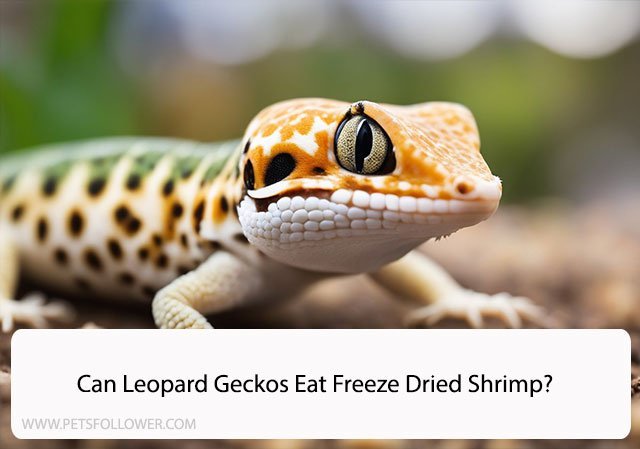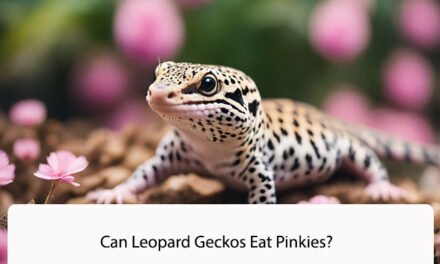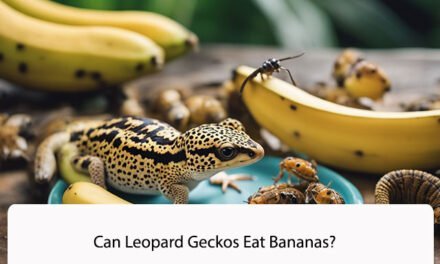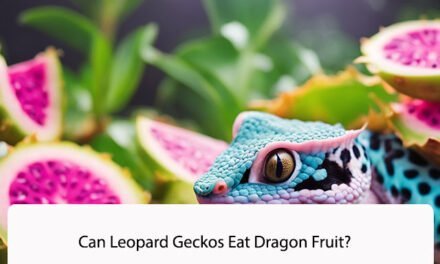Leopard geckos are a popular choice for reptile enthusiasts due to their docile nature, unique appearance, and relatively low maintenance needs. While their diet primarily consists of live insects, many owners wonder if they can supplement their gecko’s diet with freeze-dried shrimp. In this article, we will explore whether or not leopard geckos can eat freeze-dried shrimp and if it provides any nutritional benefits.
When it comes to feeding leopard geckos, it’s important to provide them with a balanced diet that meets their nutritional needs. While they primarily eat live insects such as crickets and mealworms, many owners like to offer their geckos a variety of foods to prevent boredom and ensure they receive all necessary nutrients. Freeze-dried shrimp is one such food that some owners consider adding to their gecko’s diet. However, before doing so, it’s important to understand the potential benefits and risks.
In this article, we will discuss the nutritional content of freeze-dried shrimp, whether or not it’s a suitable food for leopard geckos, and any potential risks associated with feeding it to them. By the end of this article, you will have a better understanding of whether or not freeze-dried shrimp should be included in your leopard gecko’s diet.
Leopard Gecko Dietary Basics
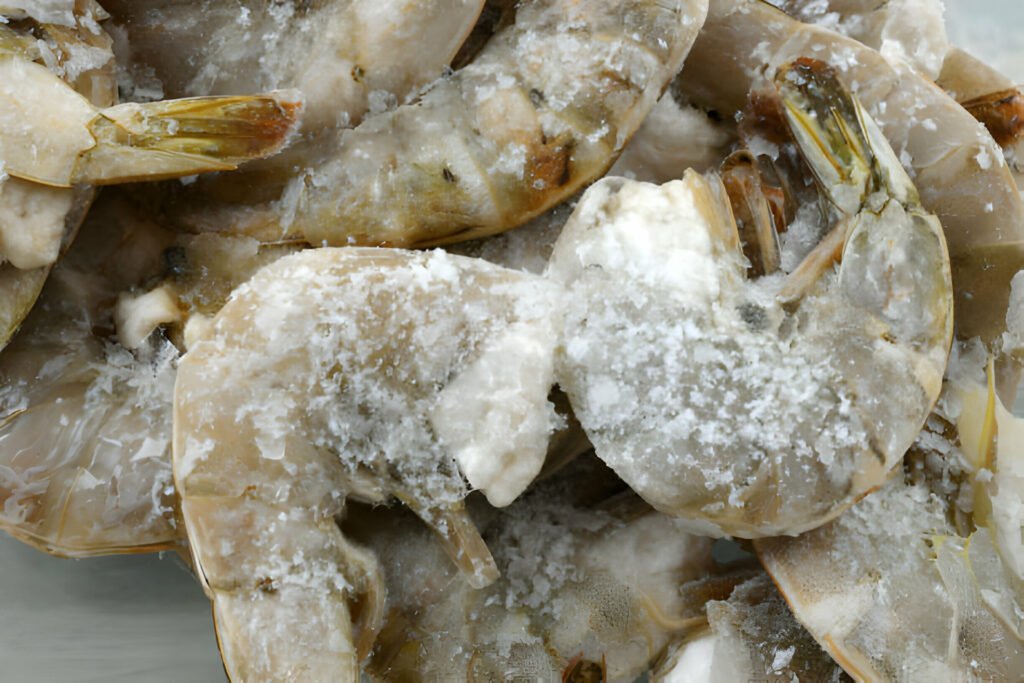
Leopard geckos are insectivores and require a diet rich in protein to maintain their health. In the wild, they eat a variety of insects, including crickets, mealworms, and waxworms. In captivity, they can be fed a similar diet, but it is important to ensure that the insects are properly gut-loaded and dusted with calcium and vitamin supplements.
Natural Diet of Leopard Geckos
In the wild, leopard geckos primarily eat insects, but they may also consume small reptiles, rodents, and other small animals. Their diet varies depending on their habitat and availability of food sources. However, in captivity, it is recommended to feed them a diet consisting of crickets, mealworms, and waxworms.
Nutritional Requirements
Leopard geckos require a balanced diet that is high in protein, calcium, and other essential nutrients. Insects should be gut-loaded with a nutritious diet before feeding to the geckos. Additionally, it is important to dust the insects with calcium and vitamin supplements to prevent nutritional deficiencies.
Below is a table outlining the nutritional requirements of leopard geckos:
| Nutrient | Amount |
|---|---|
| Protein | 20-30% of diet |
| Calcium | 2:1 calcium to phosphorus ratio |
| Vitamin D3 | Supplemental |
| Vitamin A | Supplemental |
In summary, leopard geckos require a diet that is high in protein, calcium, and other essential nutrients. Feeding them a variety of gut-loaded insects and supplementing their diet with calcium and vitamin supplements is essential for their health and well-being.
Understanding Freeze Dried Shrimp
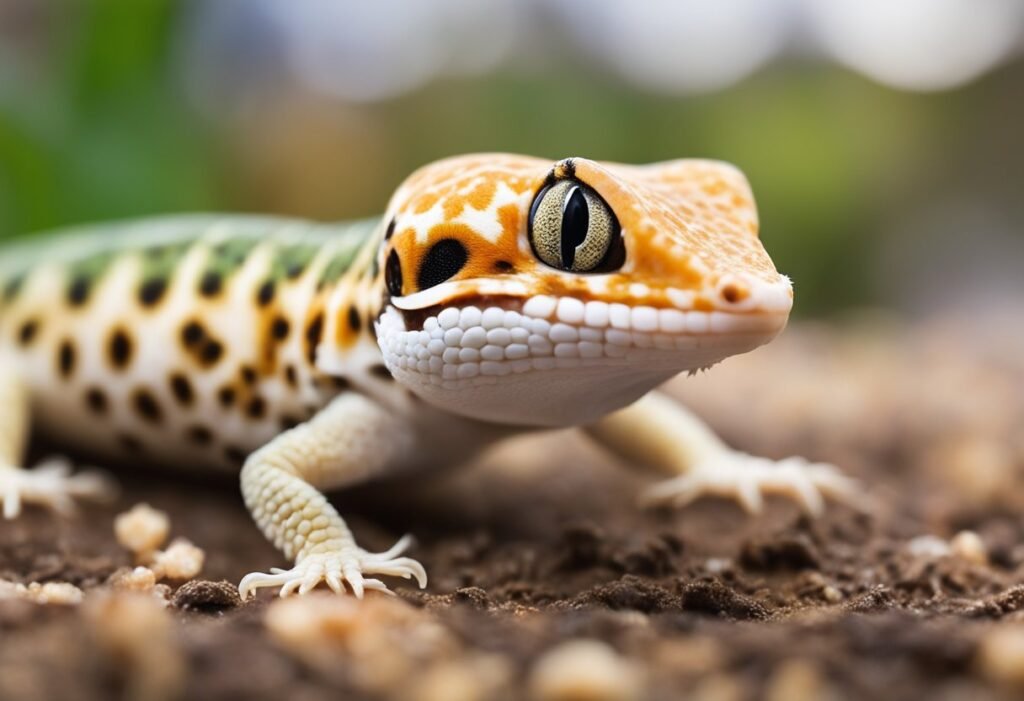
When it comes to feeding your leopard gecko, it’s important to provide a balanced diet that includes a variety of protein sources. One option that many pet owners consider is freeze dried shrimp. In this section, we’ll take a closer look at what freeze dried shrimp is and its nutritional value.
What Is Freeze Dried Shrimp?
Freeze dried shrimp is a type of shrimp that has been processed through a dehydration process. This process involves removing all of the moisture from the shrimp, which results in a lightweight, shelf-stable product that can be stored for long periods of time. Freeze dried shrimp is available in many pet stores and online retailers and is often marketed as a high-protein, natural treat for reptiles and other pets.
Nutritional Value
Freeze dried shrimp is a good source of protein for leopard geckos. According to the USDA, 100 grams of freeze dried shrimp contains approximately 60 grams of protein. In addition to protein, freeze dried shrimp also contains other essential nutrients that are important for your gecko’s health, including:
- Calcium: Freeze dried shrimp is a good source of calcium, which is important for maintaining strong bones and teeth.
- Iron: Iron is essential for the production of red blood cells and helps to prevent anemia.
- Omega-3 Fatty Acids: Freeze dried shrimp is a good source of omega-3 fatty acids, which can help to reduce inflammation and improve heart health.
Overall, freeze dried shrimp can be a nutritious addition to your leopard gecko’s diet. However, it’s important to remember that it should not be the only source of protein in their diet. It’s best to offer a variety of protein sources, including live insects, to ensure that your gecko is getting all of the nutrients they need to stay healthy.
Pros and Cons of Freeze Dried Shrimp for Leopard Geckos
Benefits
Freeze dried shrimp can be a convenient and affordable food option for leopard geckos. It is easy to store and has a long shelf life, which makes it a great backup option for when live food is unavailable. Freeze dried shrimp is also easy to prepare, as it just needs to be rehydrated with water before feeding.
Another benefit of freeze dried shrimp is that it is a good source of protein for leopard geckos. It contains essential amino acids that are necessary for their growth and development. Additionally, freeze dried shrimp is low in fat and can help prevent obesity in leopard geckos.
Potential Risks
While freeze dried shrimp can be a good source of nutrition for leopard geckos, it is important to consider the potential risks. One risk is that freeze dried shrimp may not be as nutritious as live food. Freeze drying can cause some of the nutrients to be lost, which can lead to deficiencies in leopard geckos if it is their main source of food.
Another potential risk is that freeze dried shrimp can be a choking hazard for leopard geckos. The texture of the shrimp can be dry and hard, which can make it difficult for leopard geckos to swallow. This can lead to choking or other digestive issues.
It is also important to note that freeze dried shrimp may contain preservatives or additives that can be harmful to leopard geckos. Always read the label and check for any ingredients that may be harmful before feeding freeze dried shrimp to your leopard gecko.
Overall, freeze dried shrimp can be a convenient and nutritious food option for leopard geckos, but it should not be their main source of food. It is important to offer a variety of live foods to ensure that they are getting all the necessary nutrients for their health and well-being.
Feeding Guidelines
How to Feed Freeze Dried Shrimp
When feeding freeze dried shrimp to leopard geckos, it is important to ensure that the shrimp is properly rehydrated before offering it to them. To rehydrate the shrimp, soak it in warm water for 5-10 minutes until it becomes soft and pliable.
Once the shrimp is rehydrated, it can be offered to your gecko as a treat or as a supplement to their regular diet. It is important to note that freeze dried shrimp should not be the primary source of nutrition for your leopard gecko, as they require a balanced diet of live insects and vegetables.
When feeding freeze dried shrimp, it is recommended to offer it in small pieces or as a dusting on top of their regular food. This will help to prevent overfeeding and ensure that your gecko is getting a balanced diet.
Frequency and Quantity
Leopard geckos can be fed freeze dried shrimp as a treat or supplement to their regular diet, but it should not make up more than 10% of their overall diet. It is important to ensure that your gecko is getting a balanced diet of live insects and vegetables, as freeze dried shrimp alone does not provide all of the necessary nutrients for their health.
When offering freeze dried shrimp as a treat, it is recommended to offer it no more than once a week. Overfeeding freeze dried shrimp can lead to digestive issues and obesity in leopard geckos.
In terms of quantity, it is recommended to offer no more than a few small pieces of freeze dried shrimp at a time, or a small dusting on top of their regular food. This will help to prevent overfeeding and ensure that your gecko is getting a balanced diet.
Alternative Food Options
There are several alternative food options for leopard geckos besides freeze-dried shrimp. These options include live prey, commercial diets, and supplements.
Live Prey
Leopard geckos are natural hunters and prefer live prey. Some of the best live prey options for leopard geckos include crickets, mealworms, waxworms, and superworms. These insects are readily available at most pet stores and can be purchased in bulk to save money.
When feeding live prey, it is important to ensure that the insects are gut-loaded with nutritious food before feeding them to your leopard gecko. This will ensure that your gecko receives all the necessary nutrients from its food.
Commercial Diets
Commercial diets are another alternative food option for leopard geckos. These diets are available in both dry and wet forms and are designed to provide all the necessary nutrients for your gecko. Some of the best commercial diets for leopard geckos include Repashy Gecko Diet and Pangea Fruit Mix Complete.
When feeding commercial diets, it is important to follow the manufacturer’s instructions and to ensure that your gecko is receiving the appropriate amount of food.
Supplements
Supplements are an important part of a leopard gecko’s diet. Calcium and vitamin D3 supplements are necessary to ensure that your gecko maintains proper bone health. These supplements can be added to your gecko’s food or provided in a separate dish.
It is important to note that supplements should not be used as a replacement for a balanced diet. A balanced diet should include a variety of live prey and commercial diets to ensure that your gecko is receiving all the necessary nutrients.
Overall, there are several alternative food options for leopard geckos besides freeze-dried shrimp. By providing a balanced diet that includes live prey, commercial diets, and supplements, you can ensure that your gecko remains healthy and happy.
Health Monitoring
As responsible pet owners, we must keep a close eye on our leopard geckos’ health. This includes monitoring their nutrition and feeding habits, as well as their weight and overall well-being.
Signs of Nutritional Deficiency
Leopard geckos require a balanced diet to maintain their health. If they are not receiving proper nutrition, they may exhibit signs of nutritional deficiency. Some common signs to look out for include:
- Lethargy
- Loss of appetite
- Weight loss
- Weakness
- Stunted growth
If you notice any of these symptoms, it is important to reassess your leopard gecko’s diet and make any necessary changes. Adding freeze-dried shrimp to their diet can provide a source of protein, but it should not be the sole source of nutrition.
Obesity and Overfeeding
While it is important to ensure that our leopard geckos are receiving enough food, overfeeding can lead to obesity and other health issues. Leopard geckos are prone to overeating, so it is important to monitor their food intake and adjust accordingly.
If your leopard gecko is becoming overweight, it may be necessary to cut back on their food or switch to a lower-calorie diet. Regular weigh-ins can also help you keep track of their weight and adjust their diet as needed.
In conclusion, monitoring your leopard gecko’s health is crucial for their well-being. By keeping an eye out for signs of nutritional deficiency and avoiding overfeeding, you can help ensure that your pet stays healthy and happy.
Safe Feeding Practices
At [our company], we prioritize the safety and well-being of our leopard geckos. When it comes to feeding them freeze dried shrimp, there are a few important practices to keep in mind.
Preparation of Freeze Dried Shrimp
Before feeding freeze dried shrimp to your leopard gecko, it is important to properly prepare it. We recommend soaking the shrimp in warm water for 5-10 minutes to rehydrate it and make it easier to digest. Be sure to remove any excess water before feeding it to your gecko.
Hygiene and Storage
Maintaining proper hygiene and storage practices is crucial when feeding freeze dried shrimp or any other type of food to your leopard gecko. Here are some tips to ensure the safety of your gecko:
- Always wash your hands before handling the shrimp or any other food item.
- Store the shrimp in a cool, dry place away from direct sunlight.
- Check the expiration date on the package and discard any expired shrimp.
- Avoid cross-contamination by using separate utensils and dishes for your gecko’s food.
By following these safe feeding practices, you can ensure that your leopard gecko stays healthy and happy.
Frequently Asked Questions
Is freeze dried shrimp safe for leopard geckos to consume?
Yes, freeze dried shrimp is generally safe for leopard geckos to consume. However, it is important to ensure that the shrimp is free of any preservatives or additives that could be harmful to your pet.
What are the dietary restrictions for leopard geckos?
Leopard geckos are primarily insectivores and require a diet high in protein. They should be fed a variety of live insects such as crickets, mealworms, and waxworms. It is important to avoid feeding them insects that are too large or difficult for them to digest.
Can leopard geckos have a varied diet that includes non-live food?
While live insects should make up the majority of a leopard gecko’s diet, they can also consume freeze dried or canned insects as a supplement. It is important to ensure that these foods are free of any preservatives or additives that could be harmful to your pet.
What are the potential risks of feeding freeze dried food to leopard geckos?
There are some potential risks associated with feeding freeze dried food to leopard geckos. These foods may not be as nutritionally complete as live insects and could lead to deficiencies if fed exclusively. Additionally, some freeze dried foods may be treated with preservatives or additives that could be harmful to your pet.
How does freeze dried shrimp compare nutritionally to a leopard gecko’s natural diet?
Freeze dried shrimp is a good source of protein and can be a nutritious supplement to a leopard gecko’s diet. However, it should not be fed exclusively as it may not provide all of the necessary nutrients that a leopard gecko requires.
What should be avoided when feeding a leopard gecko to ensure their health?
To ensure the health of your leopard gecko, it is important to avoid feeding them insects that are too large or difficult for them to digest. Additionally, it is important to avoid feeding them insects that have been treated with pesticides or other harmful chemicals. Finally, it is important to avoid overfeeding your leopard gecko as this can lead to obesity and other health problems.

